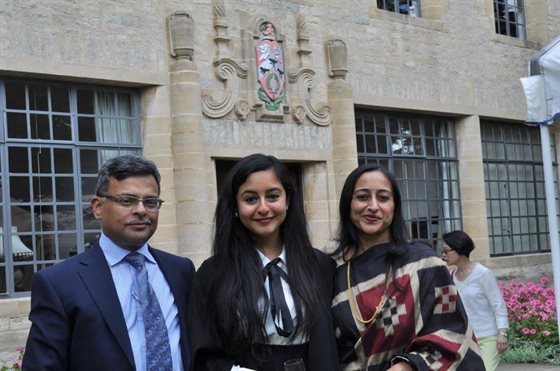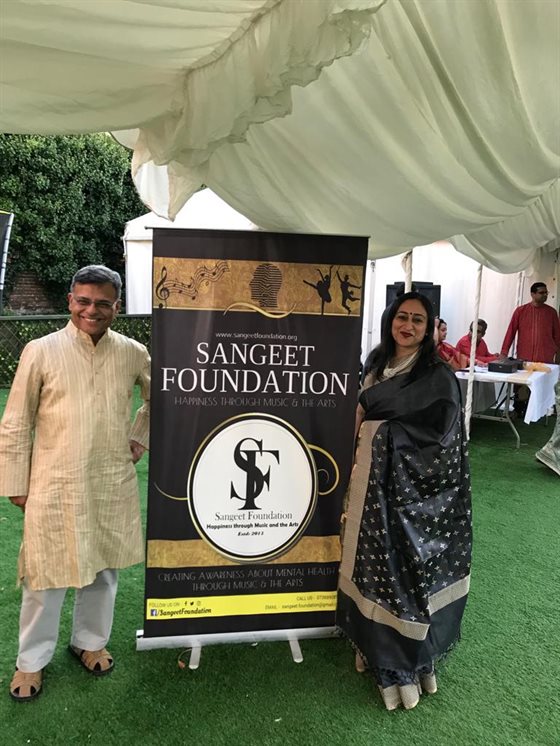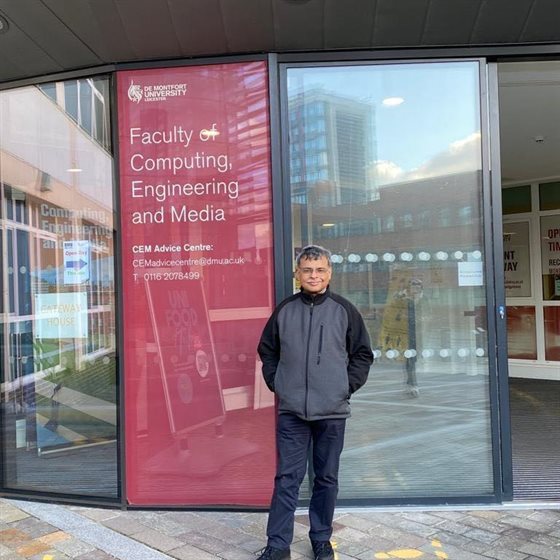A PhD student exploring how music and the arts can help people cope with mental health conditions says it is his own daughter’s journey that inspires his work.
His daughter, who was studying at Oxford University at the time, made the visit to explain to her parents how she had been diagnosed with ADHD (attention deficit hyperactivity disorder), dyspraxia, clinical anxiety and depression.

“My first reaction was denial,” said Jayanta, who started his PhD at De Montfort University Leicester (DMU) last October.
“I could not understand how my daughter, a high-flying student who always thrived at school, could be diagnosed with these conditions. In our family, and in our South Asian culture, this was not something we ever spoke about. To me, these conditions were just vague terms – I knew nothing about mental health.
“I told my daughter, this does not happen in our household – you have been fine all of these years and you are so close to getting your degree, you just need to get on with it.”
But his daughter knew she needed to take time out and put her health first, so she took a gap year and went back to live with her parents.
“That’s when I really started to see how much she was suffering,” said Jayanta. “She hardly left her bedroom and the smallest of tasks became very overwhelming for her. Even something like making a cup of tea – she just could not bring herself to do these things and I found it really frustrating.
“I was also worried about what people would think. Mental health is still a taboo subject and I did not want people to be talking about my daughter.”
Despite struggling to understand and having limited knowledge about mental health, Jayanta was desperate to help her.
“I started looking into local support groups and that’s when we found a music charity that teaches people going through hard times how to play instruments, to help them cope,” he explained. “My daughter started to learn the drums, and the difference in her wellbeing was unbelievable. I had never seen how much of an impact music could have on a person before.”
After multiple visit to specialists and counsellors – some more successful than others – Jayanta says it was medication, meditation, and music that paved the way for his daughter getting better and eventually returning to university to finish her degree and graduate.
She has since moved out of the family home to live with friends in London, where she works and has a life of her own.
“I started telling people about her story and the more I opened up, the more I realised how common mental health issues are,” continued Jayanta. “I got to thinking about how we could help other families going through the same thing.
“People do not always like speaking about mental health and there is still a stigma about having that conversation. I myself was uncomfortable talking about it when she first came home to tell us.
“But music and the arts can help break down that barrier, and I wanted to show people that.”
Alongside his wife Sutapa, Jayanta set up a new charity called the Sangeet Foundation, with the aim of raising awareness about mental health, especially within South Asian communities, and showcasing the power of music and the arts as a mental health therapy.

Jayanta and his wife Sutapa created the charity to support others
Since forming in 2015, the charity has hosted more than 100 events that bring together experts and creatives to share their knowledge and practice, and help educate people about mental health – including well-known performing artists from the UK, India, USA and South Asia, and leading practitioners such as psychiatrists, psychologists and counsellors.
The Sangeet Foundation also conducts research projects through partnerships with Higher Education institutes, including DMU and SOAS University of London, and collaborates with a wide range of organisations in the UK and India too – including charities, government bodies, non-governmental organisations and the NHS.
Through this work, Jayanta realised he had gathered a large amount of data about the impact that music and arts can have, based on the response from people who attended the Sangeet Foundation events.
“I realised I already had the research base from the work we’d been doing, so I decided to use that information and study for a PhD at DMU,” he explained.
“The vision for my PhD is to create a framework that details how to create community resilience using music and arts. The end goal is to take that framework to Parliament with the hope they will then use it within real communities, to help real people.”

Jayanta is doing his PhD at DMU and hopes to take his work to Parliament
Jayanta's daughter, who did not want to be named, said: “I feel honoured, humbled, proud and frankly I am in awe of what my dad is pioneering with the help of my mother. To have reached so many people in such an incredibly short amount of time, and with such innovative use of limited resources – all while holding down their full-time day jobs – is everything to me. It means everything.”
She added: “I am keen to stress that I still have a long way to go. This journey has been helped by the Sangeet Foundation because it is an ongoing commitment by my family to understand that mental health does not have one-time quick fixes. And that is genuinely ok.
“I never could have dreamt what my parents have achieved, especially now that my dad is doing his PhD and has the potential to make tangible change by taking his work to Parliament.
“I am excited to try and help further integrate the work that the Sangeet Foundation does, with the aim of having an exponentially positive impact on our communities and the world.”
Jayanta, who before Oishi’s diagnosis had spent his entire working career as an IT professional, says his daughter’s journey with mental health changed his life for the better, and led him to discover a new path to help others.
“My perception of mental health is completely different now,” he said. “I am a lot less judgemental because I accept that mental health is a reality.
“My daughter is my inspiration every single day. I want more people to talk about mental health because I know from experience that timely help can save time but more importantly, it can save lives.”
To find out more about the Sangeet Foundation, visit the website here. To see examples of the resources and events the charity offers, visit the YouTube channel here.
Posted on Monday 21 March 2022